Thomas James Richards, Diaries, Transcript Vol. 1, 26 August 1914 to 24 April 1915 - Part 18
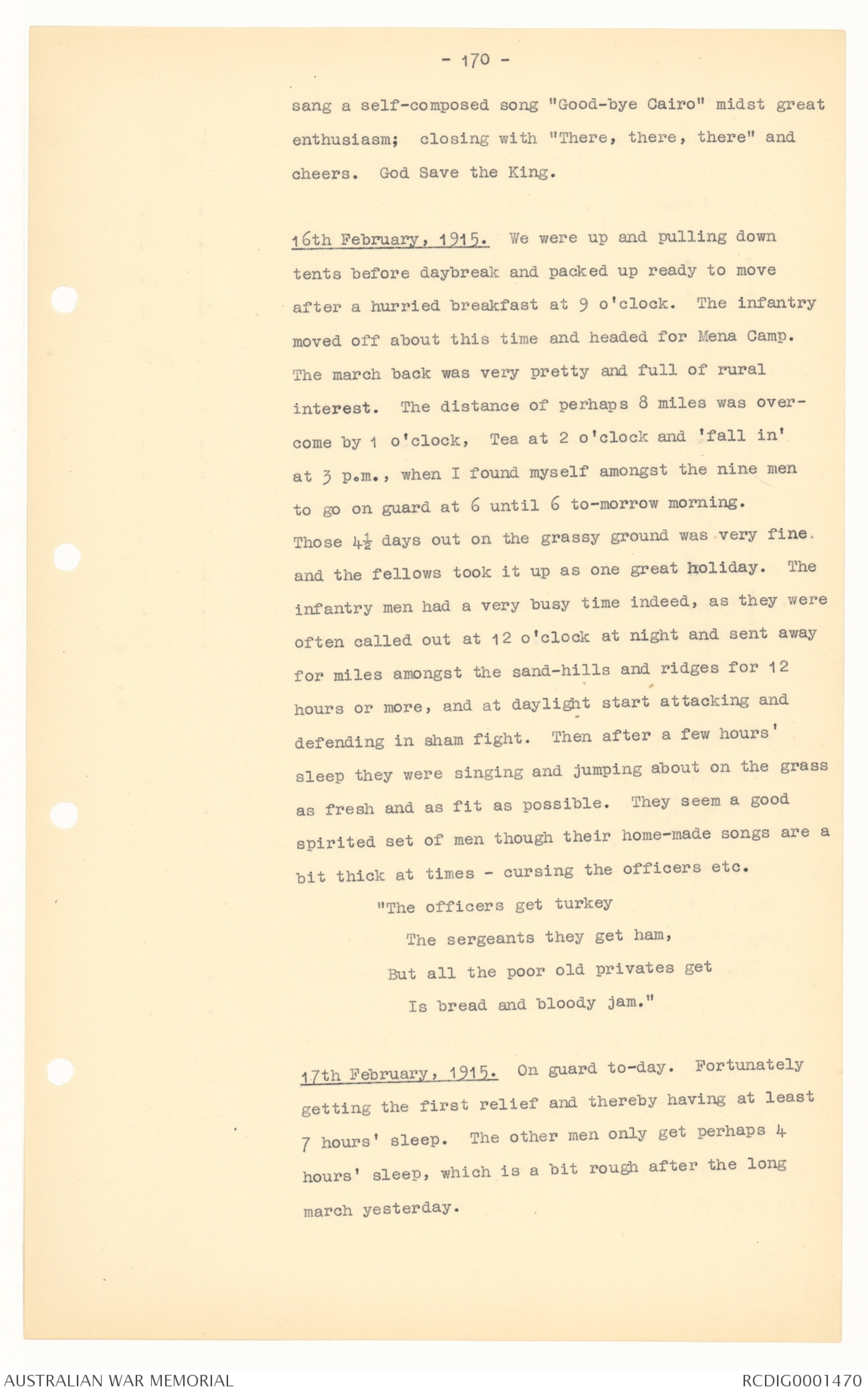
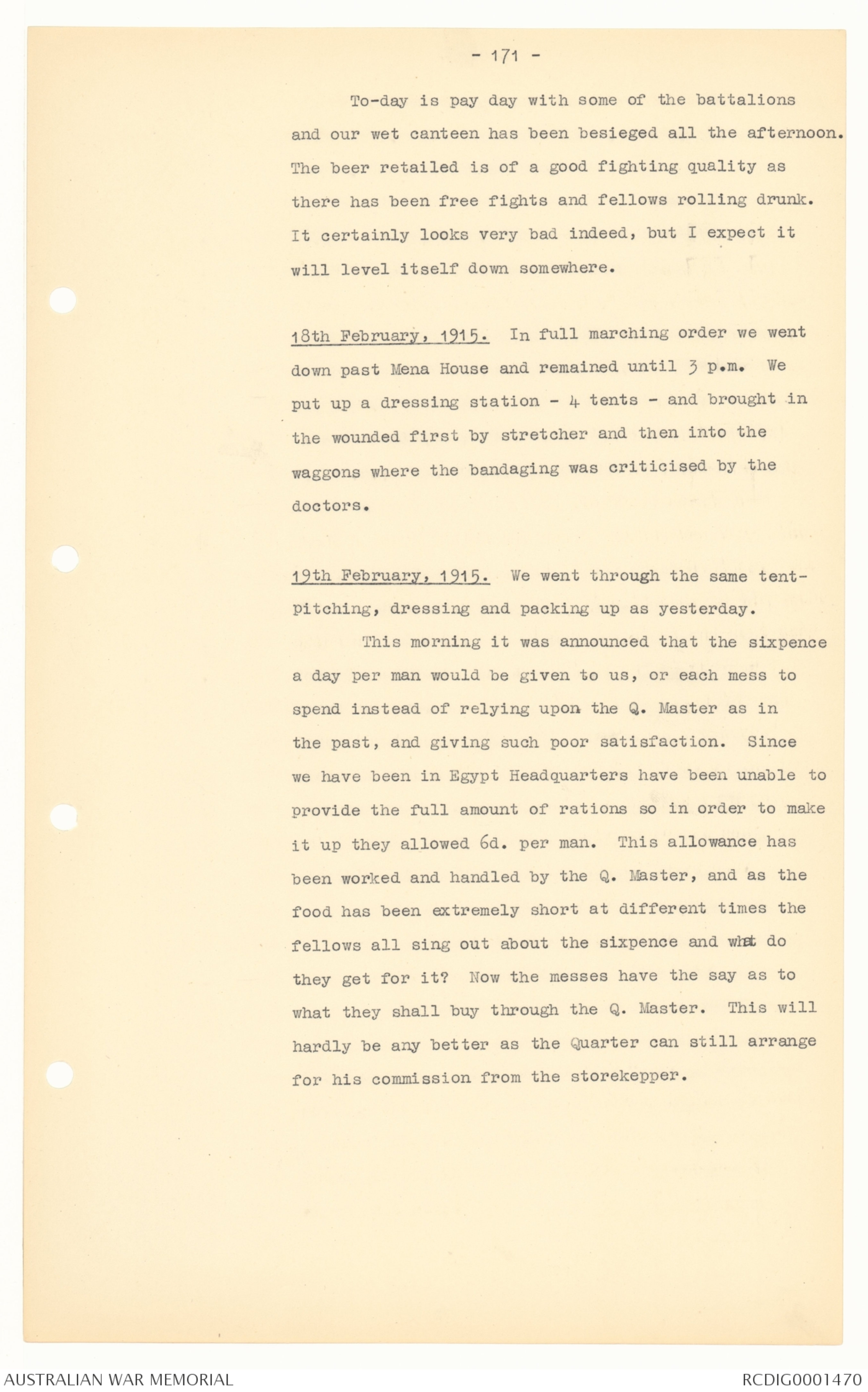
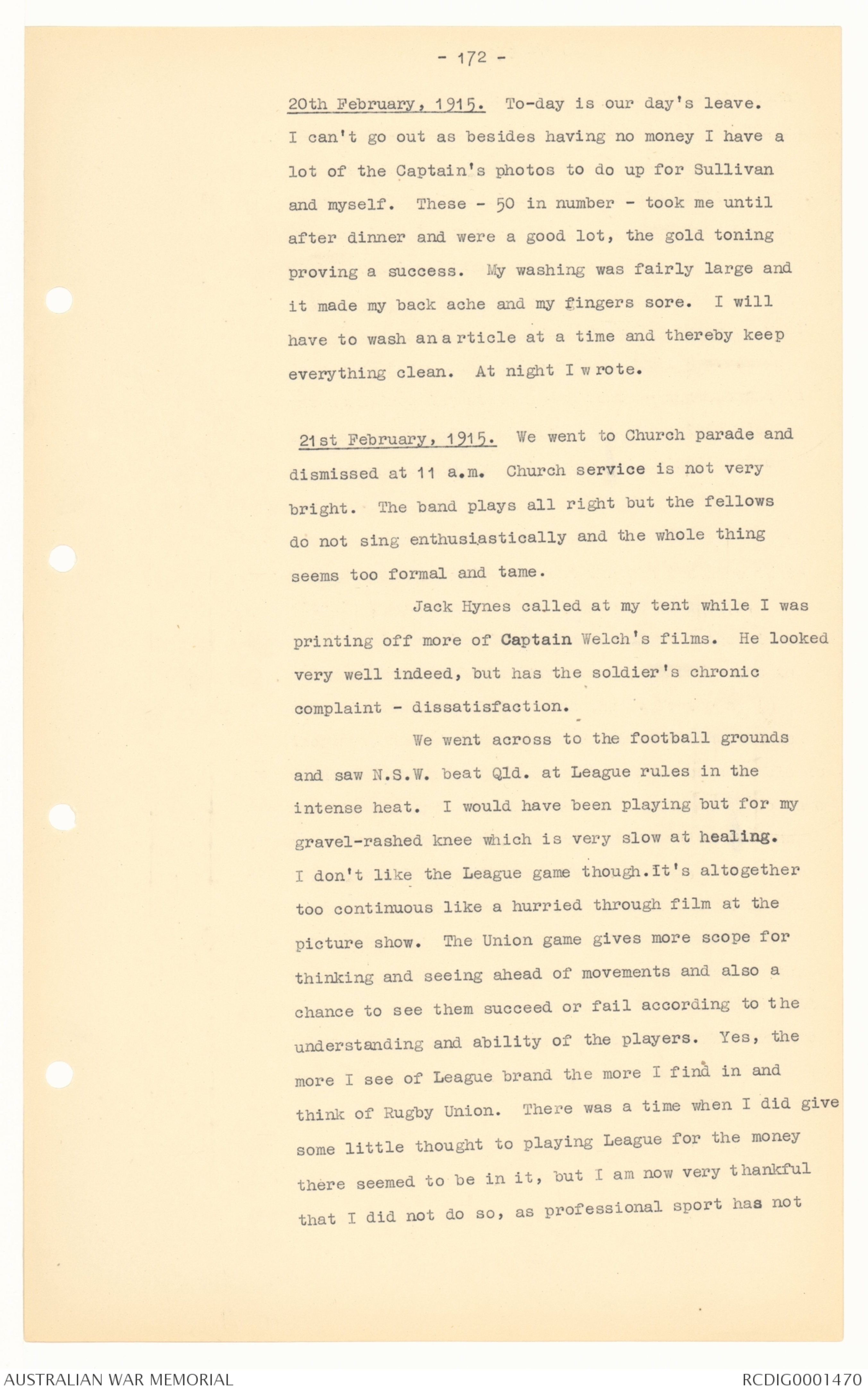
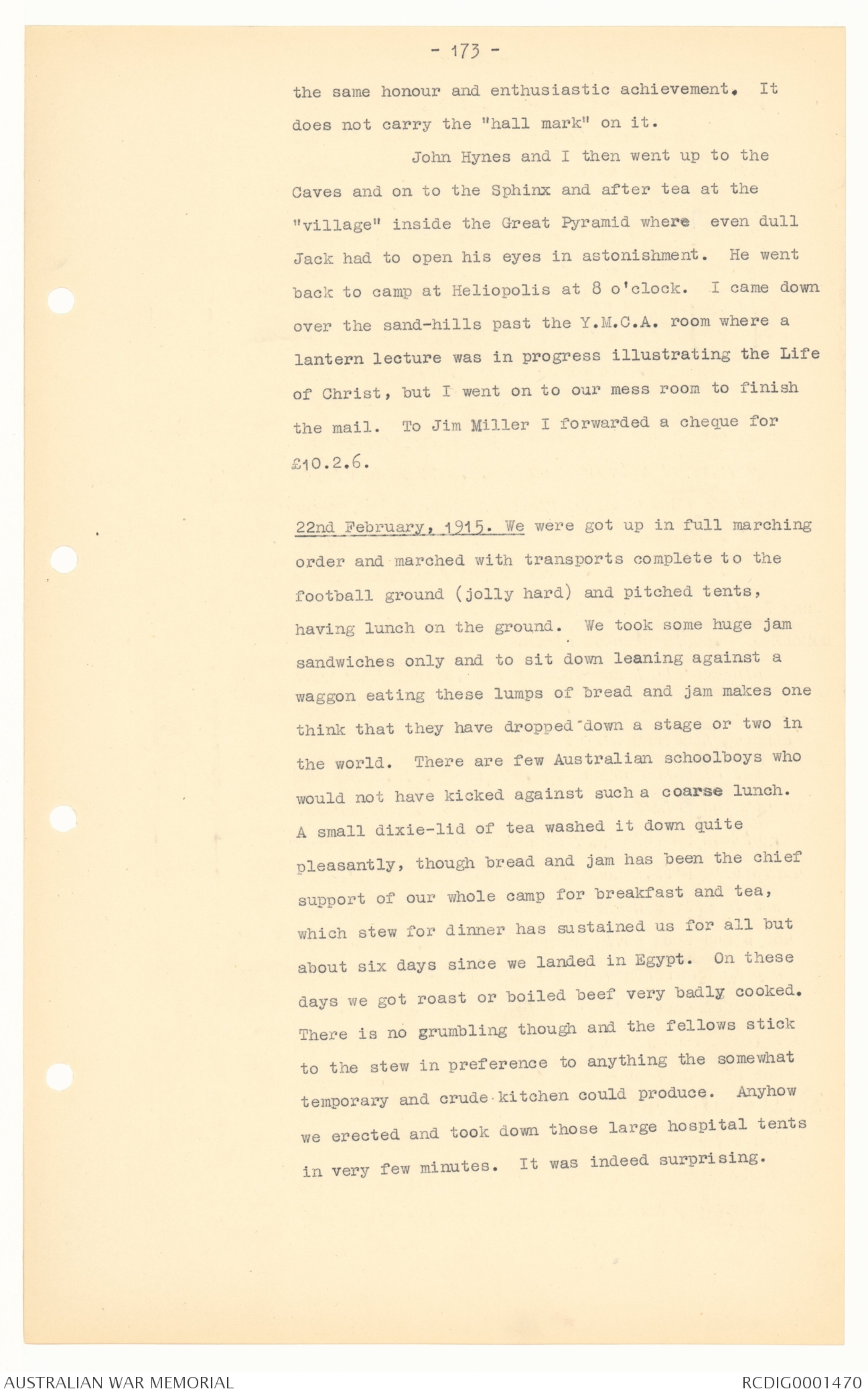
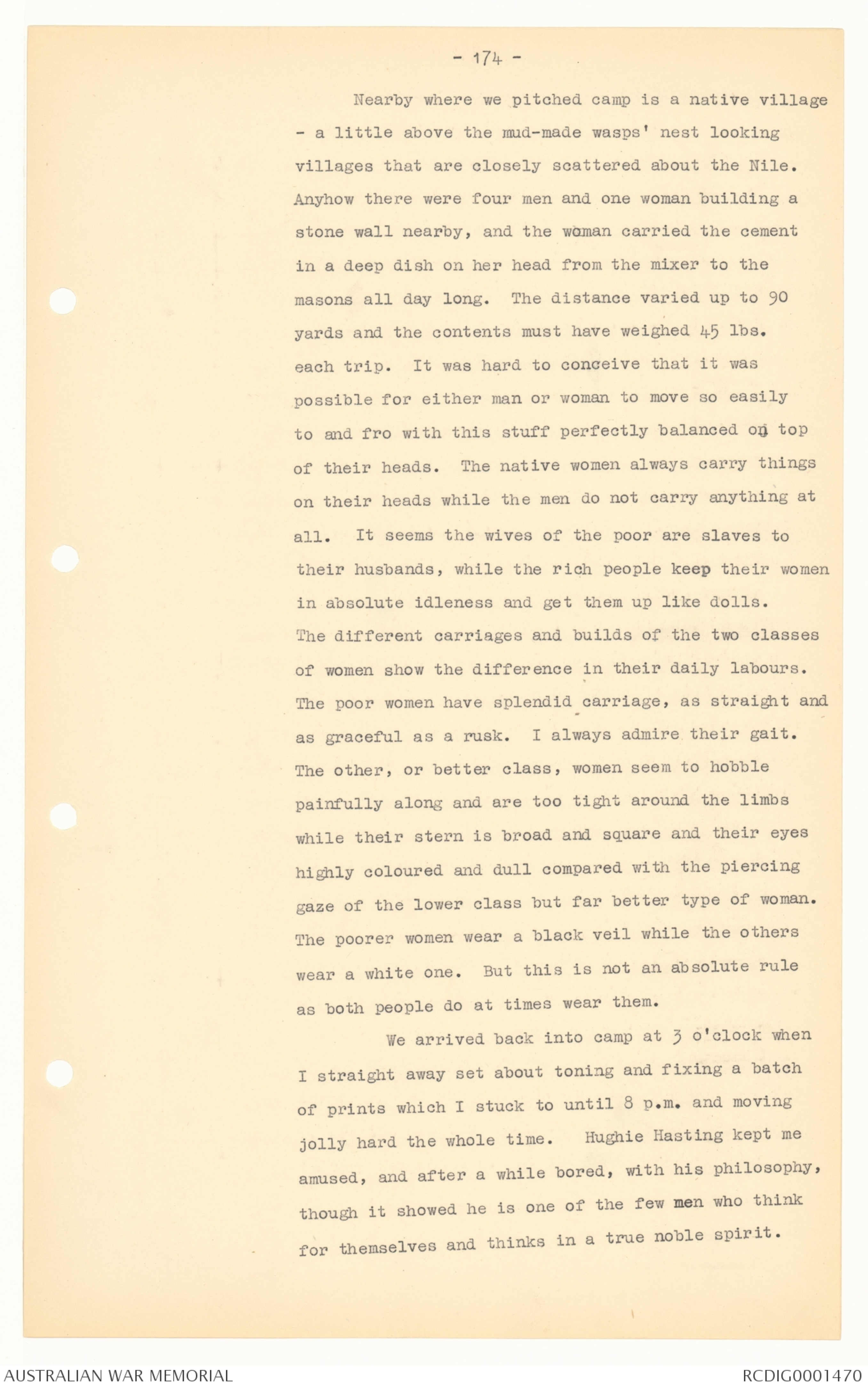
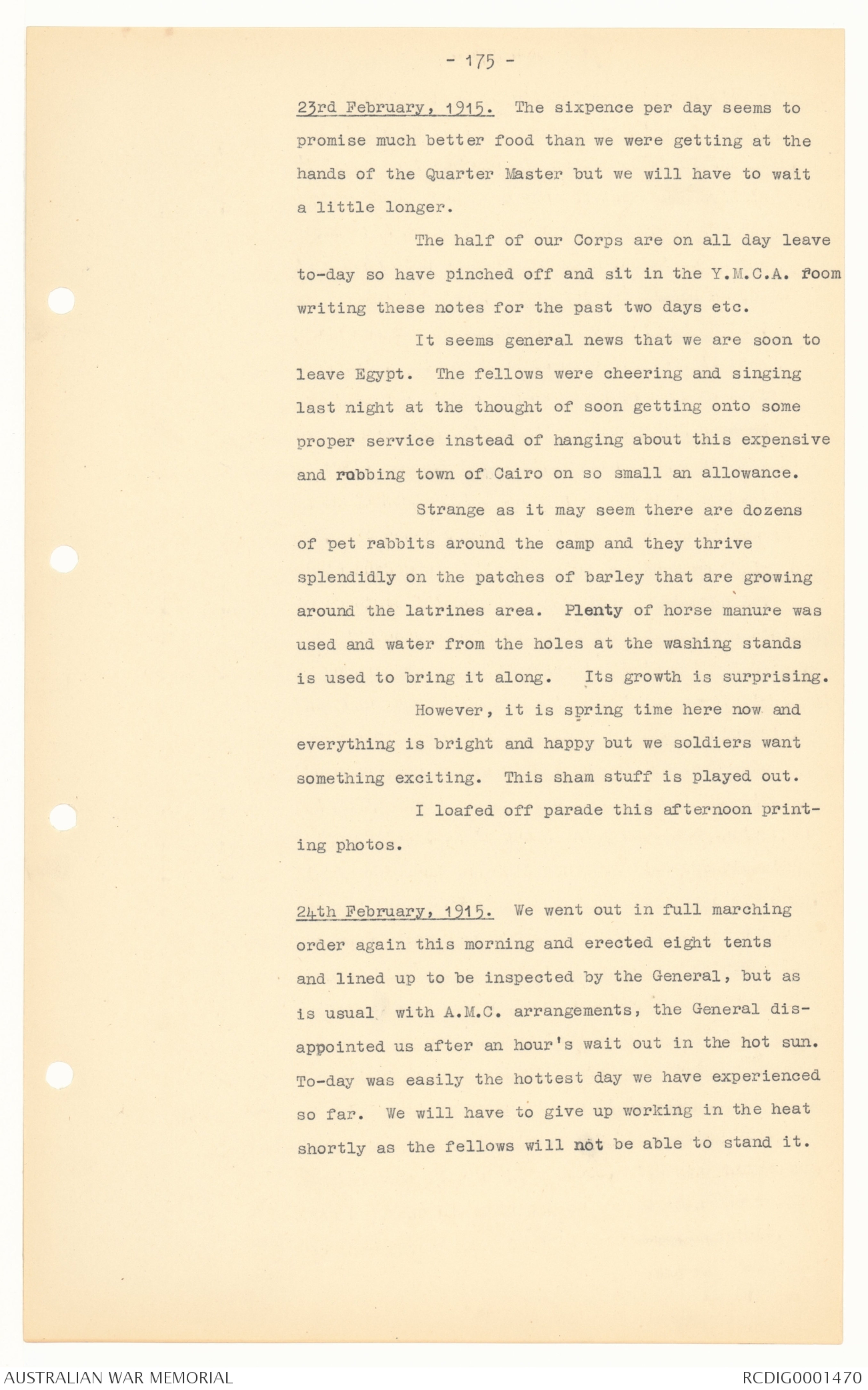
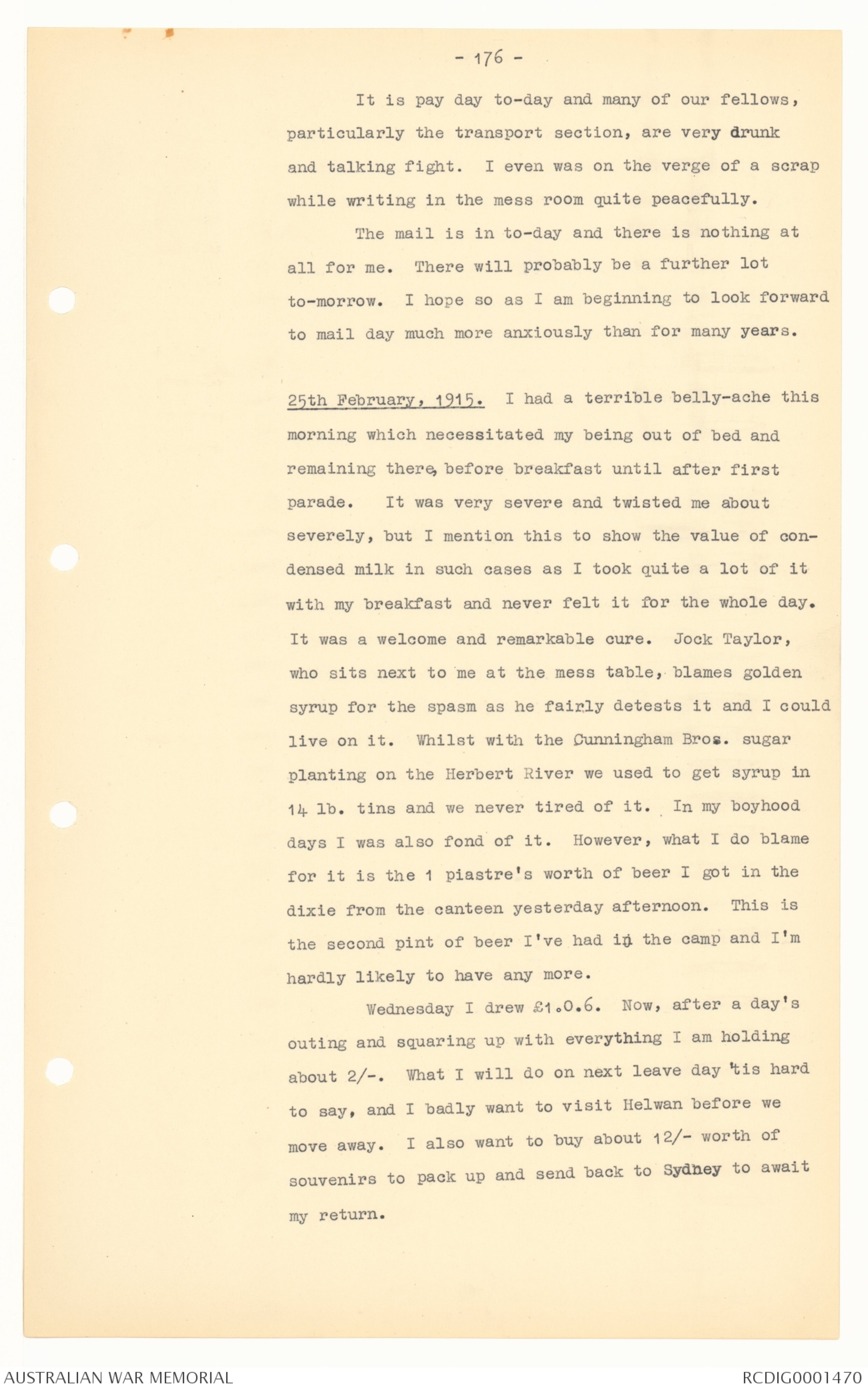
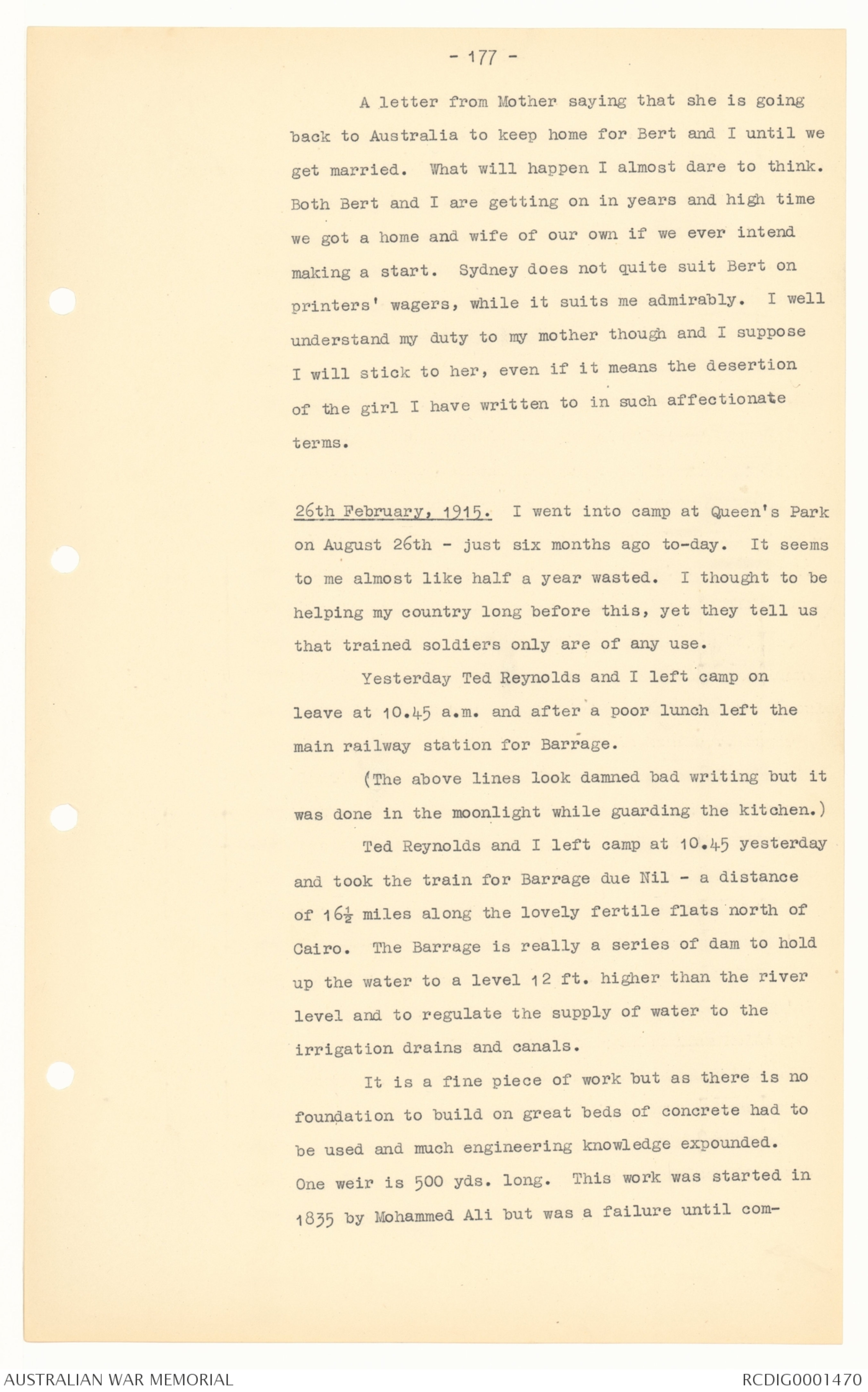
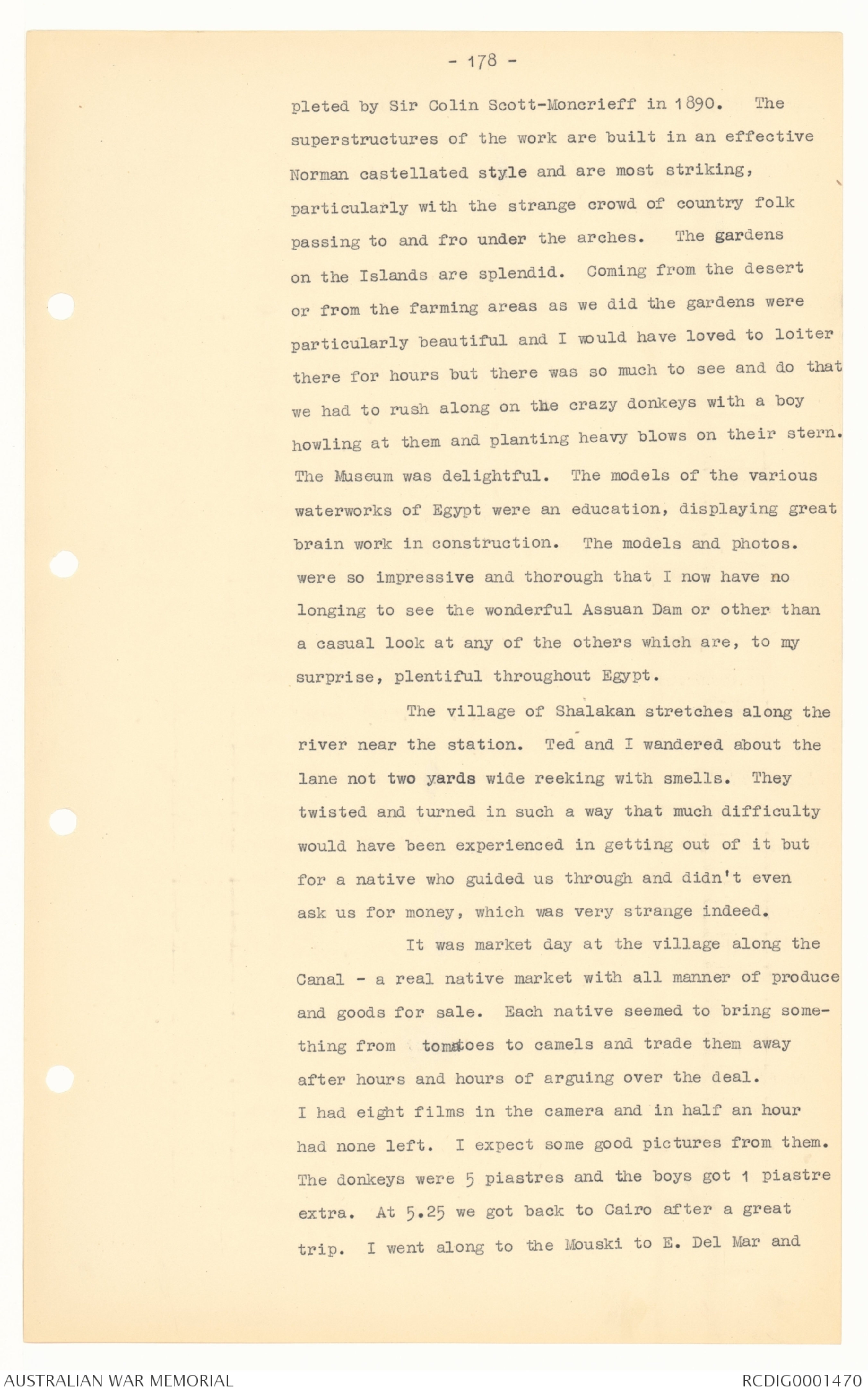
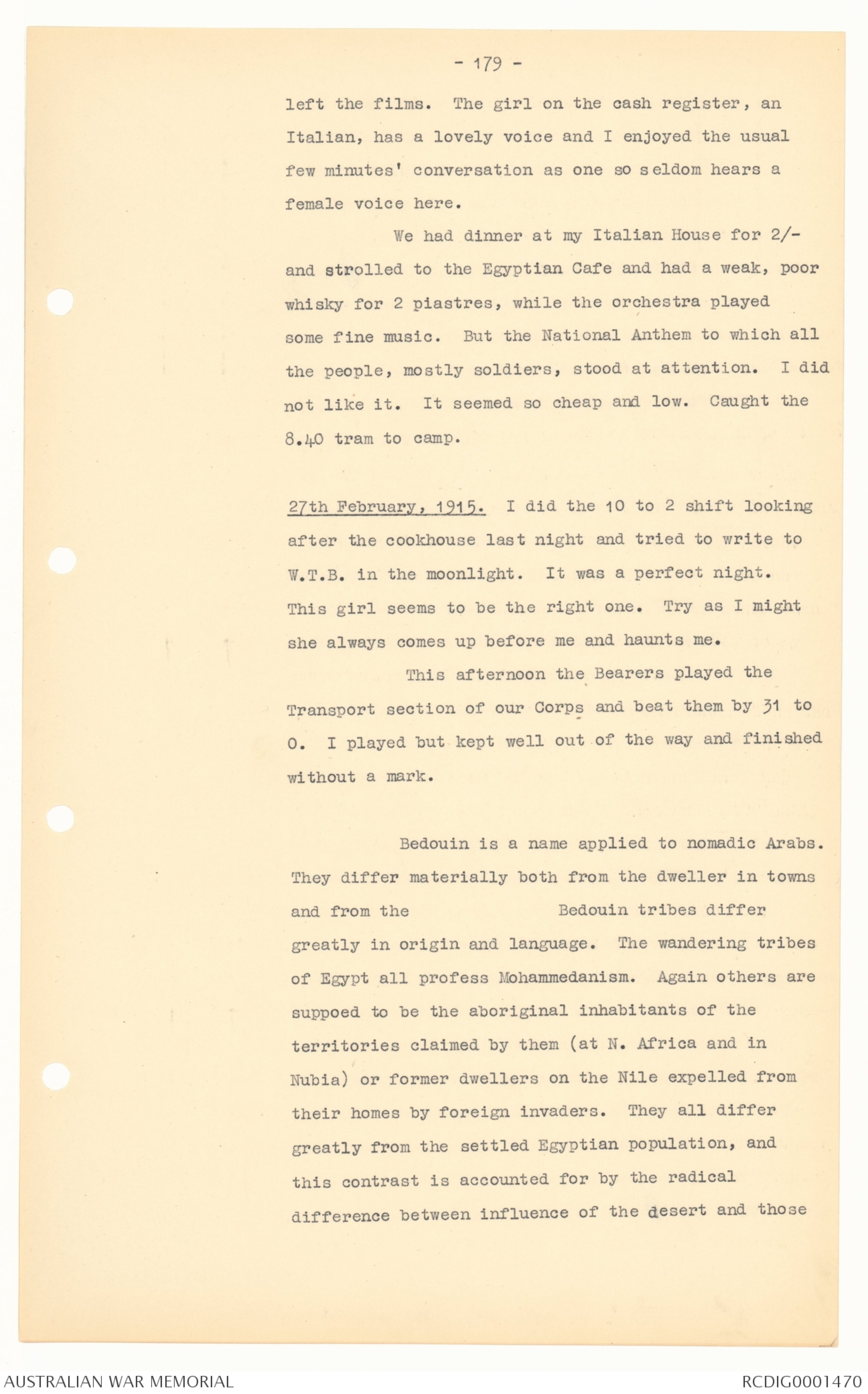
- 170 -
sang a self-composed song "Good-bye Cairo" midst great
enthusiasm; closing with "There, there, there" and
cheers. God Save the King.
16th February, 1915. We were up and pulling down
tents before daybreak and packed up ready to move
after a hurried breakfast at 9 o'clock. The infantry
moved off about this time and headed for Mena Camp.
The march back was very pretty and full of rural
interest. The distance of perhaps 8 miles was overcome
by 1 o'clock, Tea at 2 o'clock and 'fall in'
at 3 p.m., when I found myself amongst the nine men
to go on guard at 6 until 6 to-morrow morning.
Those 4½ days out on the grassy ground was very fine.
and the fellows took it up as one great holiday. The
infantry men had a very busy time indeed, as they were
often called out at 12 o'clock at night and sent away
for miles amongst the sand-hills and ridges for 12
hours or more, and at daylight start attacking and
defending in sham fight. Then after a few hours'
sleep they were singing and jumping about on the grass
as fresh and as fit as possible. They seem a good
spirited set of men though their home-made songs are a
bit thick at times - cursing the officers etc.
"The officers get turkey
The sergeants they get ham,
But all the poor old privates get
Is bread and bloody jam."
17th February, 1915. On guard to-day. Fortunately
getting the first relief and thereby having at least
7 hours' sleep. The other men only get perhaps 4
hours' sleep, which is a bit rough after the long
march yesterday.
- 171 -
To-day is pay day with some of the battalions
and our wet canteen has been besieged all the afternoon.
The beer retailed is of a good fighting quality as
there has been free fights and fellows rolling drunk.
It certainly looks very bad indeed, but I expect it
will level itself down somewhere.
18th February, 1915. In full marching order we went
down past Mena House and remained until 3 p.m. We
put up a dressing station - 4 tents - and brought in
the wounded first by stretcher and then into the
waggons where the bandaging was criticised by the
doctors.
19th February, 1915. We went through the same
tent-pitching, dressing and packing up as yesterday.
This morning it was announced that the sixpence
a day per man would be given to us, or each mess to
spend instead of relying upon the Q. Master as in
the past, and giving such poor satisfaction. Since
we have been in Egypt Headquarters have been unable to
provide the full amount of rations so in order to make
it up they allowed 6d. per man. This allowance has
been worked and handled by the Q. Master, and as the
food has been extremely short at different times the
fellows all sing out about the sixpence and what do
they get for it? Now the messes have the say as to
what they shall buy through the Q. Master. This will
hardly be any better as the Quarter can still arrange
for his commission from the storekepper.
- 172 -
20th February, 1915. To-day is our day's leave.
I can't go out as besides having no money I have a
lot of the Captain's photos to do up for Sullivan
and myself. These - 50 in number - took me until
after dinner and were a good lot, the gold toning
proving a success. My washing was fairly large and
it made my back ache and my fingers sore. I will
have to wash an article at a time and thereby keep
everything clean. At night I wrote.
21st February, 1945. We went to Church parade and
dismissed at 11 a.m. Church service is not very
bright. The band plays all right but the fellows
do not sing enthusiastically and the whole thing
seems too formal and tame.
Jack Hynes called at my tent while I was
printing off more of Captain Welch's films. He looked
very well indeed, but has the soldier's chronic
complaint - dissatisfaction.
We went across to the football grounds
and saw N.S.W. beat Qld. at League rules in the
intense heat. I would have been playing but for my
gravel-rashed knee which is very slow at healing.
I don't like the League game though. It's altogether
too continuous like a hurried through film at the
picture show. The Union game gives more scope for
thinking and seeing ahead of movements and also a
chance to see them succeed or fail according to the
understanding and ability of the players. Yes, the
more I see of League brand the more I find in and
think of Rugby Union. There was a time when I did give
some little thought to playing League for the money
there seemed to be in it, but I am now very thankful
that I did not do so, as professional sport has not
- 173 -
the same honour and enthusiastic achievement. It
does not carry the "hall mark" on it.
John Hynes and I then went up to the
Caves and on to the Sphinx and after tea at the
"village" inside the Great Pyramid where even dull
Jack had to open his eyes in astonishment. He went
back to camp at Heliopolis at 8 o'clock. I came down
over the sand-hills past the Y.M.C.A. room where a
lantern lecture was in progress illustrating the Life
of Christ, but I went on to our mess room to finish
the mail. To Jim Miller I forwarded a cheque for
£10.2.6.
22nd February, 1915. We were got up in full marching
order and marched with transports complete to the
football ground (jolly hard) and pitched tents,
having lunch on the ground. We took some huge jam
sandwiches only and to sit down leaning against a
waggon eating these lumps of bread and jam makes one
think that they have dropped down a stage or two in
the world. There are few Australian schoolboys who
would not have kicked against such a coarse lunch.
A small dixie-lid of tea washed it down quite
pleasantly, though bread and jam has been the chief
support of our whole camp for breakfast and tea,
which stew for dinner has sustained us for all but
about six days since we landed in Egypt. On these
days we got roast or boiled beef very badly cooked.
There is no grumbling though and the fellows stick
to the stew in preference to anything the somewhat
temporary and crude kitchen could produce. Anyhow
we erected and took down those large hospital tents
in very few minutes. It was indeed surprising.
- 174 -
Nearby where we pitched camp is a native village
- a little above the mud-made wasps' nest looking
villages that are closely scattered about the Nile.
Anyhow there were four men and one woman building a
stone wall nearby, and the woman carried the cement
in a deep dish on her head from the mixer to the
masons all day long. The distance varied up to 90
yards and the contents must have weighed 45 1bs.
each trip. It was hard to conceive that it was
possible for either man or woman to move so easily
to and fro with this stuff perfectly balanced on top
of their heads. The native women always carry things
on their heads while the men do not carry anything at
all. It seems the wives of the poor are slaves to
their husbands, while the rich people keep their women
in absolute idleness and get them up like dolls.
The different carriages and builds of the two classes
of women show the difference in their daily labours.
The poor women have splendid carriage, as straight and
as graceful as a rusk. I always admire their gait.
The other, or better class, women seem to hobble
painfully along and are too tight around the limbs
while their stern is broad and square and their eyes
highly coloured and dull compared with the piercing
gaze of the lower class but far better type of woman.
The poorer women wear a black veil while the others
wear a white one. But this is not an absolute rule
as both people do at times wear them.
We arrived back into camp at 3 o'clock when
I straight away set about toning and fixing a batch
of prints which I stuck to until 8 p.m. and moving
jolly hard the whole time. Hughie Hasting kept me
amused, and after a while bored, with his philosophy,
though it showed he is one of the few men who think
for themselves and thinks in a true noble spirit.
- 175 -
23rd February, 1915. The sixpence per day seems to
promise much better food than we were getting at the
hands of the Quarter Master but we will have to wait
a little longer.
The half of our Corps are on all day leave
to-day so have pinched off and sit in the Y.M.C.A. room
writing these notes for the past two days etc.
It seems general news that we are soon to
leave Egypt. The fellows were cheering and singing
last night at the thought of soon getting onto some
proper service instead of hanging about this expensive
and robbing town of Cairo on so small an allowance.
Strange as it may seem there are dozens
of pet rabbits around the camp and they thrive
splendidly on the patches of barley that are growing
around the latrines area. Plenty of horse manure was
used and water from the holes at the washing stands
is used to bring it along. Its growth is surprising.
However, it is spring time here now and
everything is bright and happy but we soldiers want
something exciting. This sham stuff is played out.
I loafed off parade this afternoon printing
photos.
24th February, 1915. We went out in full marching
order again this morning and erected eight tents
and lined up to be inspected by the General, but as
is usual with A.M.C. arrangements, the General disappointed
us after an hour's wait out in the hot sun.
To-day was easily the hottest day we have experienced
so far. We will have to give up working in the heat
shortly as the fellows will not be able to stand it.
- 176 -
It is pay day to-day and many of our fellows,
particularly the transport section, are very drunk
and talking fight. I even was on the verge of a scrap
while writing in the mess room quite peacefully.
The mail is in to-day and there is nothing at
all for me. There will probably be a further lot
to-morrow. I hope so as I am beginning to look forward
to mail day much more anxiously than for many years.
25th February, 1915. I had a terrible belly-ache this
morning which necessitated my being out of bed and
remaining there, before breakfast until after first
parade. It was very severe and twisted me about
severely, but I mention this to show the value of condensed
milk in such cases as I took quite a lot of it
with my breakfast and never felt it for the whole day.
It was a welcome and remarkable cure. Jock Taylor,
who sits next to me at the mess table, blames golden
syrup for the spasm as he fairly detests it and I could
live on it. Whilst with the Cunningham Bros. sugar
planting on the Herbert River we used to get syrup in
14 1b. tins and we never tired of it. In my boyhood
days I was also fond of it. However, what I do blame
for it is the 1 piastre's worth of beer I got in the
dixie from the canteen yesterday afternoon. This is
the second pint of beer I've had in the camp and I'm
hardly likely to have any more.
Wednesday I drew £1.0.6. Now, after a day's
outing and squaring up with everything I am holding
about 2/-. What I will do on next leave day 'tis hard
to say, and I badly want to visit Helwan before we
move away. I also want to buy about 12/- worth of
souvenirs to pack up and send back to Sydney to await
my return.
- 177 -
A letter from Mother saying that she is going
back to Australia to keep home for Bert and I until we
get married. What will happen I almost dare to think.
Both Bert and I are getting on in years and high time
we got a home and wife of our own if we ever intend
making a start. Sydney does not quite suit Bert on
printers' wagers, while it suits me admirably. I well
understand my duty to my mother though and I suppose
I will stick to her, even if it means the desertion
of the girl I have written to in such affectionate
terms.
26th February, 1915. I went into camp at Queen's Park
on August 26th - just six months ago to-day. It seems
to me almost like half a year wasted. I thought to be
helping my country long before this, yet they tell us
that trained soldiers only are of any use.
Yesterday Ted Reynolds and I left camp on
leave at 10.45 a.m. and after a poor lunch left the
main railway station for Barrage.
(The above lines look damned bad writing but it
was done in the moonlight while guarding the kitchen.)
Ted Reynolds and I left camp at 10.45 yesterday
and took the train for Barrage due Nil - a distance
of 16½ miles along the lovely fertile flats north of
Cairo. The Barrage is really a series of dam to hold
up the water to a level 12 ft. higher than the river
level and to regulate the supply of water to the
irrigation drains and canals.
It is a fine piece of work but as there is no
foundation to build on great beds of concrete had to
be used and much engineering knowledge expounded.
One weir is 500 yds. long. This work was started in
1835 by Mohammed Ali but was a failure until completed
- 178 -
by Sir Colin Scott-Moncrieff in 1890. The
superstructures of the work are built in an effective
Norman castellated style and are most striking,
particularly with the strange crowd of country folk
passing to and fro under the arches. The gardens
on the Islands are splendid. Coming from the desert
or from the farming areas as we did the gardens were
particularly beautiful and I would have loved to loiter
there for hours but there was so much to see and do that
we had to rush along on the crazy donkeys with a boy
howling at them and planting heavy blows on their stern.
The Museum was delightful. The models of the various
waterworks of Egypt were an education, displaying great
brain work in construction. The models and photos.
were so impressive and thorough that I now have no
longing to see the wonderful Assuan Dam or other than
a casual look at any of the others which are, to my
surprise, plentiful throughout Egypt.
The village of Shalakan stretches along the
river near the station. Ted and I wandered about the
lane not two yards wide reeking with smells. They
twisted and turned in such a way that much difficulty
would have been experienced in getting out of it but
for a native who guided us through and didn't even
ask us for money, which was very strange indeed.
It was market day at the village along the
Canal - a real native market with all manner of produce
and goods for sale. Each native seemed to bring something
from tomatoes to camels and trade them away
after hours and hours of arguing over the deal.
I had eight films in the camera and in half an hour
had none left. I expect some good pictures from them.
The donkeys were 5 piastres and the boys got 1 piastre
extra. At 5.25 we got back to Cairo after a great
trip. I went along to the Mouski to E. Del Mar and
- 179 -
left the films. The girl on the cash register, an
Italian, has a lovely voice and I enjoyed the usual
few minutes' conversation as one so seldom hears a
female voice here.
We had dinner at my Italian House for 2/-
and strolled to the Egyptian Cafe and had a weak, poor
whisky for 2 piastres, while the orchestra played
some fine music. But the National Anthem to which all
the people, mostly soldiers, stood at attention. I did
not like it. It seemed so cheap and low. Caught the
8.40 tram to camp.
27th February, 1915. I did the 10 to 2 shift looking
after the cookhouse last night and tried to write to
W.T.B. in the moonlight. It was a perfect night.
This girl seems to be the right one. Try as I might
she always comes up before me and haunts me.
This afternoon the Bearers played the
Transport section of our Corps and beat them by 31 to
0. I played but kept well out of the way and finished
without a mark.
Bedouin is a name applied to nomadic Arabs.
They differ materially both from the dweller in towns
and from the Bedouin tribes differ
greatly in origin and language. The wandering tribes
of Egypt all profess Mohammedanism. Again others are
suppoed to be the aboriginal inhabitants of the
territories claimed by them (at N. Africa and in
Nubia) or former dwellers on the Nile expelled from
their homes by foreign invaders. They all differ
greatly from the settled Egyptian population, and
this contrast is accounted for by the radical
difference between influence of the desert and those
 Marisa Bortolotto
Marisa BortolottoThis transcription item is now locked to you for editing. To release the lock either Save your changes or Cancel.
This lock will be automatically released after 60 minutes of inactivity.